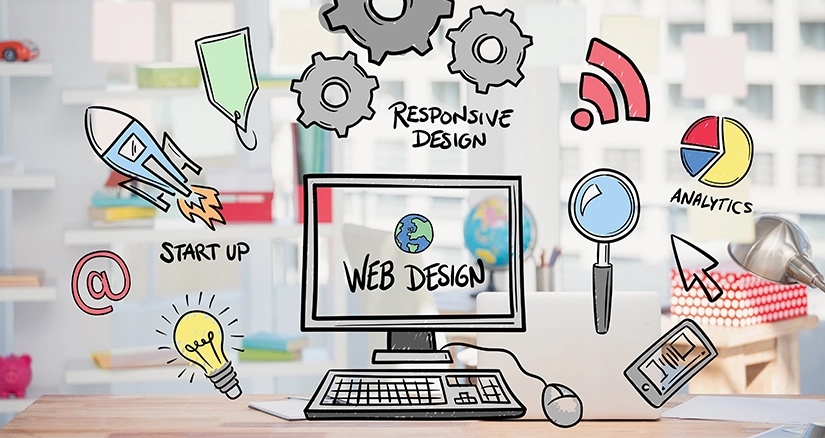How to Choose the Right Web Development Agency for Your Project

Choosing the right web development agency can make or break your digital success. Whether you’re launching a new website or rebuilding an outdated one, your choice of development partner will directly impact your site’s performance, usability, and ability to convert visitors into customers.
With countless agencies offering similar promises, the real challenge lies in identifying the one that truly understands your business goals, technical requirements, and user expectations. This guide will walk you through the essential factors to consider when selecting the right web development agency for your project—so you can make a confident, informed decision.
Your website is one of the most important investments your business can make, whether you’re launching a new venture or revamping your digital presence. But creating a high-performance website that drives real business results requires more than just good design. It requires choosing the right web development agency that understands your goals, market, and customers.
With so many options available, it can be overwhelming to select the right partner. This guide walks you through the key factors to consider to ensure your project is in capable hands.
- Define Your Project Goals Clearly
Before you begin your search, be clear about what you want your website to accomplish. Are you aiming to generate leads, sell products, offer services, or provide resources? Do you need a simple landing page or a complex web application?
By outlining your goals, budget, and desired features in advance, you’ll be better positioned to identify an agency that aligns with your specific needs.
- Review Their Portfolio and Experience
A web development agency’s portfolio reveals a lot about their style, flexibility, and experience across industries. Look for:
- Diversity in project types
- Examples similar to your business or industry
- Evidence of both design and functionality excellence
This not only helps assess their capabilities but also sparks ideas for your own project.
- Check Client Reviews and Testimonials
Reputation matters. Take the time to read through client reviews on Google, Clutch, or LinkedIn. Positive testimonials speak volumes about the agency’s professionalism, technical skills, and customer service.
Don’t hesitate to ask for references or case studies that demonstrate tangible business results from past work.
- Understand Their Development Process and Tech Stack
Ask questions about how they manage projects:
- What frameworks or CMS platforms do they use?
- How do they approach mobile responsiveness and speed optimization?
- Do they follow an agile or waterfall methodology?
The right agency will explain their workflow clearly and help you understand what technologies are best suited to your goals.
- Ask About Post-Launch Support and Maintenance
A professional agency doesn’t walk away once the site is live. They should offer:
- Ongoing technical support
- Security monitoring and regular updates
- Bug fixes and performance improvements
Be sure to clarify what support is included in your package and what’s considered additional.
- Evaluate Communication and Collaboration Style
Good communication is critical to project success. From the first interaction, assess whether the agency:
- Listens to your needs
- Responds promptly
- Explains technical aspects clearly
- Assigns a dedicated project manager
Effective collaboration leads to fewer misunderstandings and faster execution.
- Understand Their Pricing Structure
Transparency in pricing is a must. A trustworthy agency will:
- Provide a detailed estimate
- Explain the pricing model (fixed, hourly, milestone-based)
- Clarify what is included and what may incur extra charges
Avoid going with the cheapest option—it may cost more in the long run due to poor quality or hidden issues.
- Look for Strategic Thinking Beyond Just Code
A top-tier agency won’t just ask what features you want—they’ll ask why. They’ll offer insights on:
- UX and user behavior
- Conversion optimization
- SEO and performance considerations
You want a partner who can think holistically and guide you toward building a website that supports business growth.
Here are a few more details that you should bear in mind before you finalize working with any web development agency,
Core Features
Regardless of your industry or business size, your agency should be capable of delivering the following:
1. Mobile Responsiveness
Your website must work flawlessly across devices—phones, tablets, and desktops. Ask how they test and optimize for different screen sizes and resolutions.
2. Speed Optimization
Page speed is crucial for both user experience and SEO. Expect image optimization, lazy loading, minified code, and efficient server-side scripting.
3. SEO-Ready Structure
Your site should launch with clean URLs, proper heading hierarchy, meta tags, alt attributes, and schema markup to improve its visibility on search engines.
4. User-Friendly CMS
You should be able to manage your content with ease. Ask whether they’ll build on platforms like WordPress, Webflow, or a custom CMS with an intuitive backend.
5. Security Measures
Look for features like SSL integration, data encryption, anti-spam protection, and secure login systems. Agencies should also offer regular updates and security patches.
6. Analytics and Tracking Setup
Your site should be integrated with tools like Google Analytics, Google Tag Manager, and Facebook Pixel for detailed performance monitoring and marketing insights.
7. Accessibility Compliance
Web accessibility (ADA or WCAG compliance) ensures your site is usable by people with disabilities, which also expands your audience and helps avoid legal risks.
8. Scalability
The site should be built with growth in mind—both in terms of users and functionality. Whether you add new services, pages, or features, the structure should support it.
9. CRM or Third-Party Integrations
From payment gateways to marketing automation tools, the agency should be skilled in integrating third-party platforms that enhance your workflow.
10. Post-Launch Training and Documentation
You should receive documentation or a walkthrough explaining how to manage the website—especially if you’ll be handling day-to-day updates internally.
Important Questions to Ask Before Hiring
Asking the right questions helps avoid surprises and ensures you’re choosing a competent, trustworthy team. Here are key categories and sample questions:
Technical Capabilities
- What technology stack do you recommend and why?
- Do you build custom themes or use templates?
- How do you handle responsive design and cross-browser compatibility?
Design and User Experience
- Will I get to review and approve wireframes or mockups?
- Can I see examples of websites you’ve designed in my industry?
- How do you balance aesthetics with functionality?
SEO and Performance
- Will the website be SEO-friendly out of the box?
- What performance optimization practices do you follow?
- Do you offer SEO audits or strategy add-ons?
Security and Maintenance
- How do you secure the website against common vulnerabilities?
- Will I receive regular backups and software updates?
- What’s your policy on fixing bugs after launch?
Project Management and Communication
- Who will be my main point of contact?
- How often will we meet or get progress updates?
- What project management tools do you use?
Ownership and Access
- Will I have full ownership of the website and its code?
- Will I get access to hosting, CMS, and analytics tools?
- What happens if we part ways?
Pricing and Timeline
- Can you provide a detailed breakdown of the cost?
- What is your typical project timeline?
- How do you handle scope changes or additional requests?
Choosing the right web development agency is a high-stakes decision that goes far beyond visual design or technical jargon. It’s about selecting a partner who can turn your ideas into a functional, scalable, and strategic digital platform that delivers real business outcomes.
From defining your goals and reviewing portfolios to evaluating communication styles and post-launch support, every step of the selection process matters. Equally important is understanding what features to expect from a modern website and asking the right questions to uncover the agency’s true capabilities—not just what they advertise.
The right agency will not only build a site that looks good but also performs well, ranks higher, loads faster, converts better, and scales smoothly as your business grows. Take the time to assess compatibility, transparency, and value—not just pricing.
Your website isn’t a one-time project—it’s a long-term asset. Choose a team that treats it that way.

Source: How to Choose the Right Web Development Agency for Your Project


